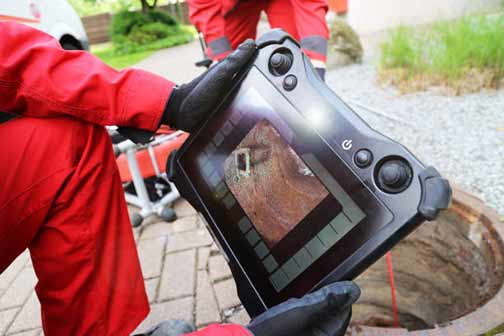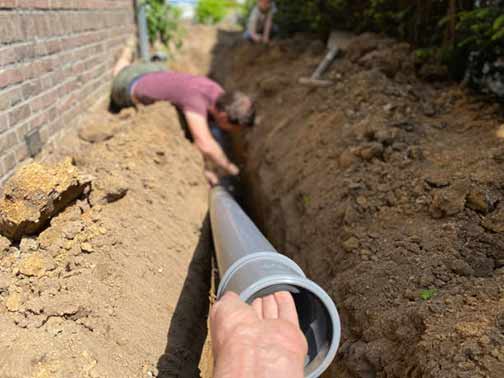
As winter approaches, homeowners often focus on preparing their homes for the cold weather. This includes tasks such as insulating pipes, sealing windows, and ensuring the heating system is in good working order. However, one critical task that is often overlooked is checking the sewer line. This simple yet essential task can prevent major plumbing problems during the winter months.
Neglecting to check your sewer line before the winter season can lead to severe consequences. The freezing temperatures can exacerbate existing issues, turning minor problems into major emergencies. By prioritizing a sewer line check, you can safeguard your home against potential disasters, ensuring a smooth and problem-free winter.
Understanding Potential Winter Plumbing Problems
Winter brings with it a host of potential plumbing issues, many of which can be traced back to the sewer line. When temperatures drop, water in the pipes can freeze, leading to blockages and even burst pipe emergencies. Frozen pipes can cause significant damage to your home’s plumbing system and can be costly to repair. Additionally, a blocked sewer line can lead to sewage backup, which can cause extensive damage to your home and pose serious health risks.
The combination of cold weather and increased water usage during the holiday season puts additional strain on your plumbing system. This makes it even more crucial to ensure that your sewer line is in optimal condition before winter sets in. Failure to do so can result in inconvenient and expensive repairs, not to mention the potential health hazards associated with sewage backups.
Reasons Why Sewer Line Checks Are Essential
Regular sewer line checks are essential for identifying and addressing potential issues before they become major problems. By inspecting your sewer line before winter, you can ensure that it is clear of any blockages or damage that could lead to issues during the colder months. This proactive approach can save you time, money, and stress in the long run.
Moreover, a well-maintained sewer line contributes to the overall efficiency and longevity of your plumbing system. It prevents small issues from escalating into costly repairs and helps maintain a healthy and safe living environment. Regular checks also provide an opportunity to address any underlying problems, ensuring that your plumbing system remains in top condition throughout the year.

A sewer camera can help you get a closer look at the inside of your sewer line.
Step-by-Step Guide on How to Check Your Sewer Line
Checking your sewer line may seem like a daunting task, but it is relatively simple with the right tools and knowledge. Here are some steps to follow:
- Visual Inspection: Start by visually inspecting the area around your sewer line. Look for any signs of damage, such as cracks or leaks.
- Use a Sewer Camera: A sewer camera can help you get a closer look at the inside of your sewer line. This tool allows you to see any blockages or damage that may not be visible from the outside.
- Check for Tree Roots: Tree roots are a common cause of sewer line blockages. Check for any trees or shrubs near your sewer line that could be causing issues.
- Hire a Professional: If you are unsure about how to check your sewer line or if you suspect there may be an issue, it is best to hire a professional plumber. They have the expertise and equipment to thoroughly inspect and address any problems.
Taking these steps can help you identify potential issues early on, allowing you to take the necessary actions to prevent major problems during the winter months. It is always better to be proactive and address any concerns before they escalate into costly and disruptive emergencies.
Implementing Preventative Measures to Avoid Sewer Line Issues
In addition to regular sewer line checks, there are several preventative measures you can take to avoid sewer line issues during the winter:
- Insulate Your Pipes: Insulating your pipes can help prevent them from freezing and bursting during the winter.
- Keep Drains Clear: Make sure to keep your drains clear of debris, such as hair and grease, to prevent blockages.
- Monitor Water Usage: Be mindful of your water usage and avoid overloading your plumbing system.
- Regular Maintenance: Schedule regular maintenance with a professional plumber to ensure your plumbing system is in good working order.
By implementing these preventative measures, you can significantly reduce the risk of sewer line issues during the winter. Taking a proactive approach to maintaining your plumbing system can save you from the inconvenience and expense of dealing with emergencies when the weather is at its harshest.
Recognizing Signs of Sewer Line Problems
It is important to be aware of the signs of sewer line problems so you can address them before they become major issues. Some common signs to look out for include:
- Slow Drains: If your drains are slow to empty, it could be a sign of a blockage in your sewer line.
- Unpleasant Odors: Foul smells coming from your drains or yard could indicate a sewer line issue.
- Water Backups: If water is backing up into your sinks, tubs, or toilets, it is a clear sign of a sewer line problem.
- Gurgling Noises: Strange gurgling noises coming from your drains can be a sign of a blockage in your sewer line.
Recognizing these signs early on can help you take prompt action and prevent further damage to your plumbing system. Ignoring these warning signs can lead to more severe problems, including sewage backups and extensive water damage.

In some cases, a sewer line replacement may be necessary to fully resolve the issue. A professional plumber can help you determine if this is the best course of action.
Steps to Take If You Have a Sewer Line Problem
If you suspect you have a sewer line problem, it is important to act quickly to prevent further damage. Here are some steps to take:
- Stop Using Water: Stop using water in your home to prevent further backups and damage.
- Call a Professional: Contact a professional plumber to inspect and address the issue. They can provide the necessary repairs and ensure your sewer line is functioning properly.
- Consider a Sewer Line Replacement: In some cases, a sewer line replacement may be necessary to fully resolve the issue. A professional plumber can help you determine if this is the best course of action.
Taking these steps can help mitigate the damage and ensure that your sewer line is repaired promptly and effectively. Working with a professional plumber ensures that the repairs are done correctly, reducing the risk of future problems.
The Benefits of Regular Sewer Line Maintenance
Regular sewer line maintenance offers several benefits, including:
- Preventing Major Issues: Regular maintenance can help identify and address potential issues before they become major problems.
- Saving Money: By preventing major issues, regular maintenance can save you money on costly repairs.
- Extending the Life of Your Plumbing System: Regular maintenance can help extend the life of your plumbing system, ensuring it functions properly for years to come.
- Peace of Mind: Knowing that your sewer line is in good working order can provide peace of mind, especially during the winter months.
Investing in regular sewer line maintenance is a wise decision that pays off in the long run. It helps you avoid unexpected emergencies, reduces repair costs, and ensures that your plumbing system remains efficient and reliable. The peace of mind that comes with knowing your sewer line is in good condition is invaluable, particularly during the winter when plumbing issues can be more challenging to address.
Conclusion: The Importance of Proactive Sewer Line Maintenance
Checking your sewer line before winter is a simple yet essential task that can prevent major plumbing problems during the colder months. By taking a proactive approach and addressing any potential issues before they become major problems, you can save time, money, and stress. Regular sewer line maintenance and preventative measures can help ensure your plumbing system is in good working order and provide peace of mind throughout the winter season.
As you prepare your home for winter, make sure to include a sewer line check on your to-do list. By doing so, you can protect your home from potential plumbing disasters and enjoy a worry-free winter. Remember, a little effort now can save you from significant headaches and expenses down the road.